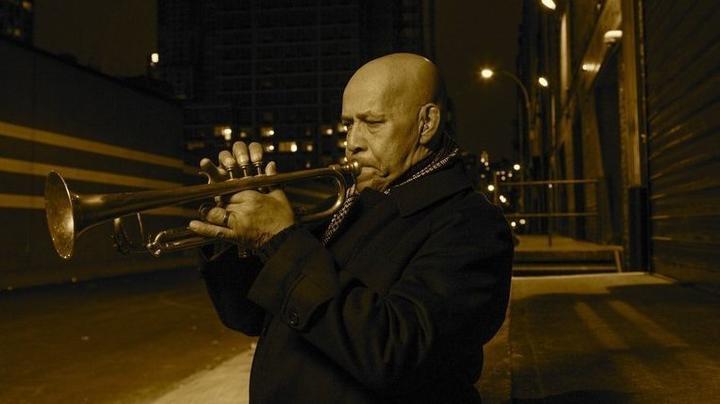Eddie Henderson: trumpet
Piero Odorici: tenor, soprano saxophone
Darryl Hall: bass
Willie Jones III: drums
Jazz trumpeter extraordinaire Eddie Henderson had his first informal lesson on the trumpet at the age of 9 from Louis Armstrong. As a teenager he studied trumpet at the San Francisco Conservatory of Music and performed with the San Francisco Conservatory Symphony Orchestra. In 1957, Eddie met Miles Davis for the first time. Davis, a family friend, admired the strikingly beautiful tone and musicality of Henderson's trumpet playing and encouraged him to pursue a career in music. As a family friend, Miles Davis has been a major musical influence on Eddie throughout his life. That culminated in May of 2002 with the recording of So What, a tribute to Davis that features songs associated with the legend. As Henderson puts it, "Miles is so very special to me because when I was in high school he stayed in my parents' house when he came through San Francisco. I was going to the conservatory then studying classical music. I saw him do all these songs live that I recorded on the tribute album." Eddie had the good fortune of meeting many famous musicians growing up - including getting early tips from Satchmo - because his parents were both entertainers. His mother was a dancer at the original Cotton Club and his father a member of the popular singing group Billy Williams and the Charioteers. His stepfather was a doctor to people like Miles and Coltrane and Duke Ellington, so the association with musicians continued. Eddie studied hard in school and in addition to excelling on his instrument, he excelled academically enough to go to medical school and become a doctor. Dr. Henderson practiced as a physician part-time for many years, in addition to playing gigs and learning directly from two of his other main trumpet influences - Lee Morgan and Freddie Hubbard. In addition to his stint with Herbie Hancock, Henderson has performed with such notables as Art Blakey, Dexter Gordon, Roy Haynes, Jackie McLean, Joe Henderson, Elvin Jones, Johnny Griffin, Slide Hampton, Benny Golson, Max Roach and McCoy Tyner. In addition to his European Tours, Eddie performs in the Mingus Big Band and tours with the Eddie Henderson Quartet.
****
It must be something in the genes. Born in New York City on October 26, 1940, Eddie Henderson speaks with enormous pride of his childhood. "I have a pretty imposing show business heritage. My mother was one of the dancers in the original Cotton Club. She had a twin sister, and they were called The Brown Twins, and they used to dance with Bill 'Bojangles' Robinson and the Nicholas Brothers. That film of Fats Waller doing 'Ain't Misbehavin' where the lady sits on the piano and he sings to her? That's my mother. And my father sang with Bill Williams and the Charioteers, who were like the number one black singing group in the nation-over and above the Ink Spots and the Mills Brothers.
"My real father died when I was nine, and my mother remarried a doctor in San Francisco, and so I guess that influenced me to pursue medicine as well. But I never stopped the music ever since I was nine years old. Louis Armstrong was literally my first trumpet teacher, in person, because my mother knew all of these people. Duke Ellington. Count Basie. Billie Holiday was my mother's roommate. Sarah Vaughan was my mother's roommate. She knew Dizzy Gillespie from her days dancing in the chorus line in front of Cab Calloway's big band, when Dizzy was just starting out in the section. All these people used to come over to the house, and to me they were just average people. Little did I know," he laughs.
The family moved to San Francisco in 1954, and there, from 1954 to 1957, Eddie studied trumpet, flugelhorn, and music theory at the San Francisco Conservatory of Music. After three years in the Air Force, Henderson enrolled at U.C. Berkeley, graduating with a B.S. in zoology in 1964. He then studied medicine at Howard University in Washington, DC, graduating in 1968. Though he did his residency in psychiatry, he only practiced general medicine. During this period, he performed occasionally with John Handy, Joe Henderson, Big Black, and Philly Joe Jones.
From 1968 until the late Eighties, Henderson mixed music and medicine, and received his first major musical exposure as a member of Herbie Hancock s trailblazing sextet, an ensemble that also included young innovators such as Bennie Maupin, Julian Priester, Buster Williams, and Billy Hart. From 1960 through 1973 they recorded Mwandishi and Crossings for Warner Bros. and Sextant for Columbia. His experiences with Hancock exerted a profound influence on Henderson, as reflected in the music on his first two solo albums, Realization and Inside Out, recorded in 1972 and 1973 for Capricorn Records.
After leaving Hancock, the trumpeter worked extensively with Pharoah Sanders, Norman Connors, and Art Blakey's Jazz Messengers, returning to the San Francisco Bay Area in 1975 where he joined the Latin-jazz group Azteca, and fronted his own bands. The expressive rhythmic thrust of Henderson's jazz/fusion experiences manifested itself on his Blue Note recordings Sunburst and Heritage, and in 1977, he broke through with a single on the Billboard charts, "Prance On" (from the album Comin' Through).
